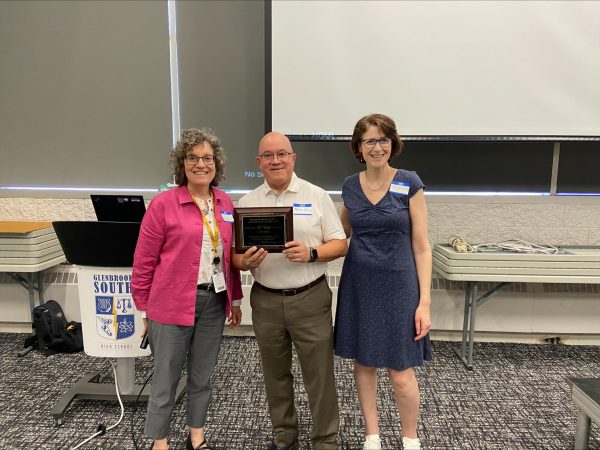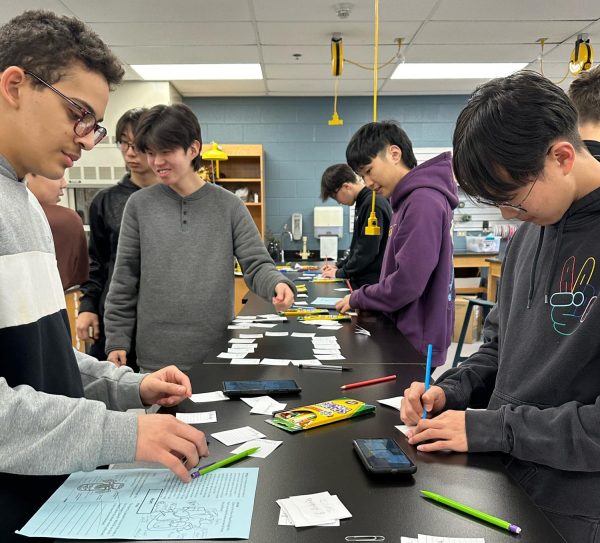NHS two (virtual) years later
Induction ceremony returns in-person for 2022
March 18, 2022
The National Honor Society (NHS) will once again recognize accepted students during an in-person awards ceremony on March 29 after two Covid-19 altered years, Hillel Crandus, NHS Sponsor and English Teacher, said.
This year’s ceremony will resemble previous years’, with choir performances, speeches from Mark Maranto, Assistant Principal for Student Activities, Interim Principal Dr. Rosanne Williamson, and David Kane, winner of last year’s Distinguished Teacher Award, Crandus said. Last year’s inductees were also invited to the ceremony to be recognized, Crandus said.
To join NHS, students submit applications in the winter of their junior or senior year. Applications are then processed by a faculty review board composed of five faculty members, (Math Teacher Joseph Karlovsky, Spanish Teacher Jorge Zamora, John Klasen, Director of College Counsel, Joy Cooper, Titan Learning Center Coordinator, and Kaitlin Budny, Social Studies Teacher), Crandus said. The board evaluates applicants on the Six Pillars of Character: responsibility, trustworthiness, citizenship, fairness, respect, and caring, Crandus explained.
Requirements to be admitted include keeping an unweighted 3.5 GPA or higher; involvement in a service project; participation in four activities in at least two categories available: athletics, student/government service organizations, performing arts and journalism, and special interest clubs, according to the NHS application.
At South, NHS holds a reputation as a prestigious society for students, junior Olivia Podyma said. After applying this year, Podyma explained that being admitted would indicate a student’s commitment and effort throughout high school.
“[Being admitted] would mean a lot to me,” Podyma said. “A lot of smart kids are in NHS; being in NHS would prove that I can do it and that I’m smart.”
Founded in 1921 as a national organization, NHS has aimed to honor students who have worked hard throughout their high school career, Crandus said. But in the last few years, due to the pandemic, the NHS has experienced changes.
“Last year [2021] we sent out a video [of the induction ceremony] and two years ago [2020] we sent the certificates home, no one knew what was going on,” Crandus said.
In a time of increasingly competitive college admissions, not all students believe NHS provides a significant boost to applications, senior Elizabeth Clary explained. With a small service hour requirement and a single teacher recommendation, the requirements for acceptance are not challenging.
“Some [colleges] had the option to say that you were a member of NHS, [while] others didn’t because not all [high schools] have it,” Clary said. “I don’t think it’s helped anyone get into college, there’s such a low threshold.”
While the NHS recognition itself does not inherently boost a student’s college acceptance chances, the requirements improve their odds, Klasen said.
“I absolutely [think that] having something like NHS on your college application is a nice addition,” Klasen said. “It’s what NHS asks in terms of requirements that gets students involved in other aspects of the school.”
The debate on NHS’s impact on college admissions distracts from its original goal of recognizing service, Crandus said. At its core, the purpose of NHS is to create enthusiasm for scholarship, to stimulate a desire to render service, promote leadership, and develop character in the students of secondary schools, the NHS constitution states.
“The original goal was to emphasize the importance of service and the importance of good citizenship and scholarship,” Crandus said. “This organization wanted to create an award in order to support those values.”
*Noah Oberbroeckling, Sydney O’Hara, Kaia Otwell, Luciana Plazas, Yechan Sohn, and Milutin Todorovic








